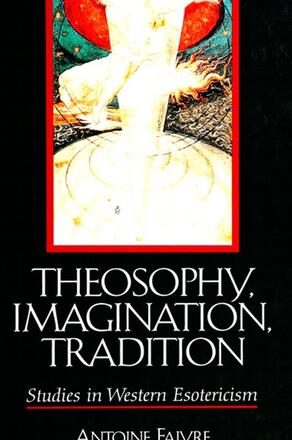Provenance of the Articles Published in This Volume
Preface: Esotericism and Academic Research
Geneses
Universities
Criteriologies
Methods
THEOSOPHIES
THE THEOSOPHICAL CURRENT: A PERIODIZATION
I. The Birth and the First Golden Age of the Theosophical Current (End of the Sixteenth Century Through the Seventeenth Century)
Its Gensis and Appearance
The Characteristics of Theosophy and the Reasons for Its Success
The First Corpus and the First Critical Discourses
II. The Transitional Period (First Half of the Eighteenth Century)
Two Theosophical Families
Some Succinct Criticisms
Jacob Brucker, or the First Systematic Description
III. From Pre-Romanticism to Romanticism, or the Second Golden Age
Reasons for the Revival
Three Areas of the Theosophical Terrain
The Word "Theosophy" and a Few Criticisms
IV. Effacement and Permanence (End of the Nineteenth to Twentieth Centuries)
Factors in the Dissolution
A Discreet Presence
New Perspectives on the Theosophical Current
THEOSOPHY AND SPECULATIVE MYSTICISM OF THE BAROQUE CENTURY IN GERMANY (NOTE ON THE WORKS OF BERNARD GORCEIX)
Valentin Weigel
Johann Georg Gichtel
Mysticism and Theosophy in Baroque Germany
Theater, Kabbalah, and Alchemy
Society and Utopias
THEOSOPHICAL POINTS OF VIEW ON THE DEATH PENALTY
Louis-Claude de Saint-Martin
Joseph de Maistre
Franz von Baader
EXERCISES OF IMAGINATION
VIS IMAGINATIVA (A STUDY OF SOME ASPECTS OF THE MAGICAL IMAGINATION AND ITS MYTHICAL FOUNDATIONS)
From Jacob's Sheep to the Magical Seed of Paracelsus
Ways, Byways, and Stakes in the Great Century
Pre-Romatic Versions
From Romantic Naturphilosophie to Occultist Spheres of Influence
THOUGHTS OF GOD, IMAGES OF MAN (FIGURES, MIRRORS, AND ENGENDERING IN J. BOEHME, F.C. OETINGER, AND F. VON BAADER)
I. Sophia and the Bildniss of Jacob Boehme
The Sophianic Mirror
The Image in Man: Greatness and Self-Effacement
The Image in Man: Paths of Renewal
II. Mirrors and Engendering in Franz von Baader
The Theory of the Three Images
Images and Reflections in God, in Man, and in Nature
FROM THE DIVINE FIGURE TO THE CONCRETE FIGURE, OR TRANSPARITION THROUGH MIRRORS
Introduction: Two Apocrypha, One Homily
I. The Isomorphy of the Images and of Its Model
Primacy of the Image for Access to the Model
Isomorphy of Light and of the Eye
II. The Reciprocal Engendering of the Image and Its Model
The Personal Presence
Reciprocal Engendering Through Seeing
Perspectives
IN TERMS OF "TRADITION"
THE ROSICRUCIAN MANIFESTOS (1614, 1615) AND THE WESTERN ESOTERIC "TRADITION"
I. Medieval Esoteric Themes in the Manifestos
Literary Themes
Arithmology and Organon
The Philosophy of Nature
II. Presence of Renaissance Philosophia Occulta in the Manifestos
Paracelsism
Esoteric Themes in Vogue in the Latin Renaissance
Presence of the New Hermes
III. The Manifestos Between the Old and the New
Torchlight and Shadow
The Fortunes of a Paradox
Literary Esotericism in the Wake of the Manifestos
Perspectives
ANALYSIS OF THE MEDITATIONS OF VALENTIN TOMBERG ON THE TWENTY-TWO MAJOR ARCANA OF THE TAROT OF MARSEILLES
Introduction: Bio-bibliographical Elements and Situation of the Work
I. Christian Hermeticism and Traditions
The Tarot and Hermetic Symbolism
East and West
The Hermetic Balance: Mysticism, Gnosis, and Sacred Magic
II. Nature Philosophy and Anthropology
The Signature of Things and Universal Becoming
Living Polarities
Hermetic Points of View on Man
Regrets and Queries
RAYMOND ABELLIO AND THE WESTERN ESOTERIC "TRADITION"
I. Esoteric Elements and Themes
Biographical Data and the Gnosis Tradition
Traditional Sciences and the "Primoridial Tradition"
II. Esotericism and Modernity
Rene Guenon and the Status of the West
Abellio and His Kin
III. Raymond Abellio's Specific Contribution to Esotericism
Phenomenology and Absolute Structure
Universal Interdependence and Love
Perspectives
A BIBLIOGRAPHICAL GUIDE TO RESEARCH (CONTINUED)
General Works
Alchemy
Freemasonry and Fringe Masonry
From the Second (Corpus Hermeticum) to the Fifteenth Centuries
Renaissance and Seventeenth Century
Eighteenth Century
Romanticism and Naturphilosophie
From the Nineteenth Through the Twentieth Centuries
Concerning Tradition
Esotericism, Literature, and Art
Journals and Serials
Index of Names
